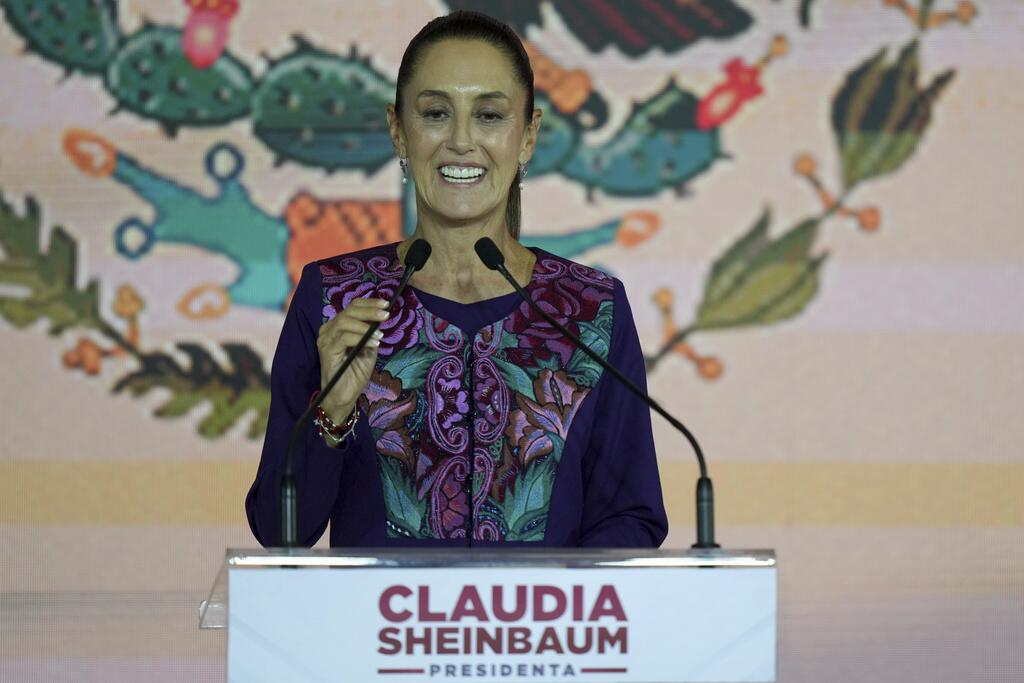The passing of the presidential sash every six years is always an important and symbolic occasion in Mexico.
But on Tuesday, when it was placed over the shoulder of Claudia Sheinbaum – the first woman to hold the highest office in the country – it was truly an historic watershed moment in more than 200 years of modern Mexican history.
It has been a long road which led the first female mayor of Mexico City to break the glass ceiling in Mexican politics again, this time at national level.
To huge cheers of “Presidenta!” ringing out both inside and outside the congressional chamber, she raised her fist in victory, savouring the moment.
She began her first speech as president by thanking her political mentor and predecessor in the top job, Andrés Manuel López Obrador, calling him “the most important political leader and social warrior in Mexico’s modern history”.
He leaves office, she said, with “the greatest love of his people”.
On that point, she is not wrong. López Obrador is deeply beloved by his supporters and his popularity ratings in his final days in office were higher than those of any other president in Mexican history.
He undoubtedly leaves very big shoes for her to fill, but President Sheinbaum was quick to stress that she was not daunted.
“It is time for women,” she said to applause from the governing party’s lawmakers. “Women have arrived to shape the destiny of our beautiful nation.”
As she set out her agenda as president, it was again clear that López Obrador’s vision for Mexico had provided a broad blueprint.
She urged people to assess – using cold hard facts – what had been achieved over the past six years.
“How were 9.5 million Mexicans pulled from poverty?” she asked.
“How was unemployment reduced? Greater well-being created? The minimum wage repeatedly increased, but not inflation?”
Her conclusion was simple: through “Mexican humanism” – the name she gives to the political project she has shared with her mentor, López Obrador, for the best part of two decades.
Naturally, her detractors will contest the rosy image of the Mexican economy she painted.
But Sheinbaum promised to “consolidate the health service into the highest quality free public healthcare system” and to create a further 300,000 places in higher education in new public high schools and universities.
“Health and education are rights of the Mexican people, not privileges nor merchandise,” she insisted.
There are clearly going to be major challenges ahead, too.
The drug war in Mexico continues to rage out of control, particularly in the states of Sinaloa and Chiapas.
The fallout from a bitter split in the Sinaloa Cartel has seen gun battles rage in the streets of the northern city of Culiacán and will not be easy for any leader to bring under control.
Sheinbaum’s critics say her experiences in improving the security of the capital city cannot simply be applied at the federal level – especially, they argue, if she follows López Obrador’s approach and opts against tackling the cartels head on.
Certainly the shadow of her predecessor will loom large.
The man she called “brother, friend, compañero” insists he will be stepping back from political life and enjoying his retirement at his ranch in Chiapas.
But some suspect he may be too addicted to politics to walk away from it entirely.
Sheinbaum’s rise to the presidency is the culmination of her time at his side, her stellar career from student activist to climate scientist to mayor of Mexico City now complete that she has been sworn in as the nation’s leader.
It has been an extraordinary journey in and of itself – one which she insists is only just beginning.
“I’m a mother, grandmother, scientist, a woman of faith, and now, president!” she said as she wrapped up her inaugural speech.
She promised to govern for all Mexicans and put her “knowledge, strength, my past and my very life” to work to defend Mexico.
There will pressure on her to succeed in her own right from the very start.
However, the many millions of Mexican men and women who voted for her will surely grant her a little time and the benefit of the doubt.
“I won’t let you down,” she told them. (https://www.bbc.com/news/articles/ce3z263453lo)





































